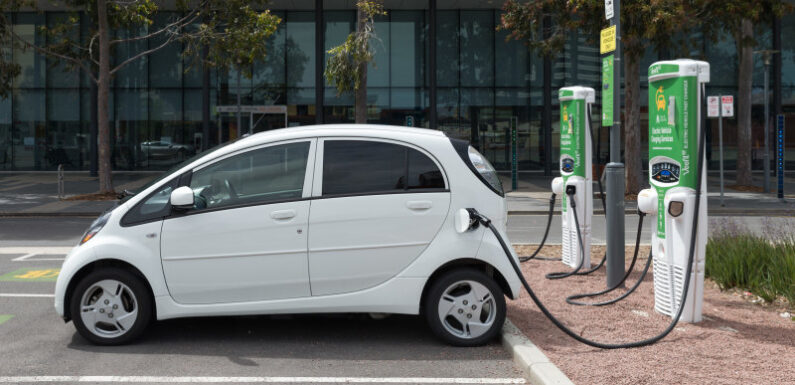
Save articles for later
Add articles to your saved list and come back to them any time.
VicRoads has overcharged electric vehicle owners, hit them with penalties resembling robo-debt and unreasonably cancelled registrations, the ombudsman says.
Victorian Ombudsman Deborah Glass said in a report released on Wednesday that the transport department had been “unreasonable and wrong” in handling complaints about the state’s Zero and Low Emission Vehicle (ZLEV) distance-based charge.
The ombudsman has branded VicRoads’ actions unreasonable.
“We found an unreasonable lack of policy guidance to those administering the legislation, inflexible
handling of complaints, and an unwillingness to exercise discretion,” she said.
The state government introduced the controversial road tax in 2021. Electric vehicle owners pay 2.8 cents per kilometre they drive, and 2.3 cents per kilometre for plug-in hybrids, in lieu of the fuel excise tax.
Environmentalists have slammed the tax as a handbrake on EV adaptation and challenged it in the High Court.
The ombudsman’s report says that the Department of Transport and Planning has charged EV owners for more kilometres than they have driven, and been “unfair and unhelpful” in response to complaints.
More than 30 electric vehicle owners complained to the watchdog about being charged for driving hybrid cars mostly on petrol – meaning they paid double tax on the distance-based charge and fuel excise – and being penalised for submitting their annual odometer readings late.
In one case, a hybrid owner’s partner drove the car on a 22,000-kilometre journey around Australia using petrol 95 per cent of the time.
The owner submitted fuel receipts and GPS data to the department, but it refused to use its discretion to waive the $377.44 distance-based charge. It told the man to contact the Department of Treasury and Finance for assistance, despite it not being responsible for the EV tax.
Glass’ investigation asked the department to explain why it refused this and other requests for charge waivers. The ombudsman found “it did not have a policy or guidance material to help decide
applications for a waiver”.
“At the time of writing, the Department had received over 180 complaints about the ZLEV Act. Many of the complainants described the unreasonableness of the ZLEV charge’s application to their
circumstances,” the report said.
“Department staff often provided unclear, unfair and unhelpful responses to complaints about
the ZLEV charge,” the ombudsman said. Two-thirds of complaints were categorised as being a policy and dismissed.
“It is unreasonable that the Department failed to create even a basic policy or guidance around the reviewability of charges. This should have occurred before or at the time the ZLEV Act came into
operation,” the ombudsman concluded.
EV owners must submit a photograph of their odometers to VicRoads to calculate their EV charge payments. The department has cancelled an estimated 243 vehicle registrations after owners failed to do this.
Victorian Ombudsman Deborah Glass. Credit: Penny Stephens
Glass said she had received complaints from owners whose registrations were cancelled after they had paid their registration fee, but could not photograph their odometers because they were overseas.
One such ZLEV owner then had to pay for another registration fee and roadworthy certificate to re-register their vehicle, creating “a significant financial penalty”.
“Compounding the apparent unfairness of this situation is the fact some complainants
were unaware there was a risk of their registration being suspended or cancelled,” the report says.
On top of that, VicRoads charged a late penalty to owners which was applied at an estimated average distance of 37 kilometres driven per day in addition to their actual travel.
“As the robo-debt inquiry showed us, there are dangers in making assumptions and using average calculations to charge people,” the ombudsman said.
The report said the ZLEV Act did not allow the department to impose a penalty on electric vehicle owners for late declarations. The department had refused to amend invoices that included a penalty, “even where the estimated kilometres were shown to be inaccurate”.
Glass said the mishandling of the scheme had “broader lessons for the public sector about the dangers of making policy on the run (or not making it at all), and the importance of exercising discretion”.
“The Department appears to be using the High Court challenge to the legislation as a smokescreen for inaction,” she said.
VicRoads told the investigation it was committed to improving its practices and affirmed it should respond to complaints on a case by case basis, the report said.
The ombudsman recommended the department revisit all complaints about the ZLEV charge, stop charging penalties and develop better processes for handling complaints.
The Department of Transport and Planning has been contacted for comment.
The Morning Edition newsletter is our guide to the day’s most important and interesting stories, analysis and insights. Sign up here.
Most Viewed in National
From our partners
Source: Read Full Article

